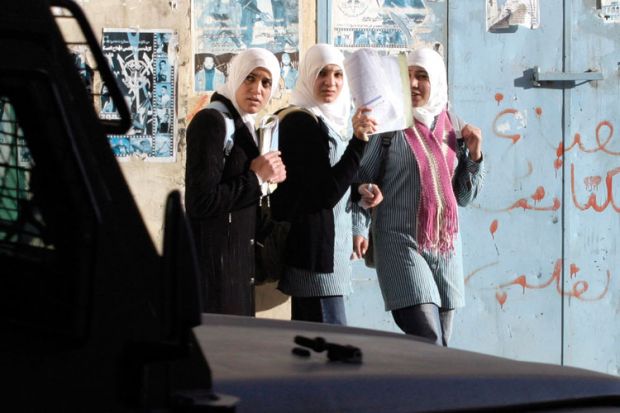Come to our MENA Universities Summit from 2-4 February 2016
A University of Bristol academic has distilled his experiences of teaching in Palestine for a semester into a vivid account of “teaching under occupation”.
In 2013, Tom Sperlinger, reader in English literature and community engagement, was given a chance to spend five months teaching Shakespeare and 19th-century fiction at Al-Quds University near Jerusalem. Both his classroom experience and “the acute situation” of the university proved intense and disturbing, so he decided to keep “a very detailed diary”. It is this account that he has now developed into Romeo and Juliet in Palestine.
“The [separation] wall is on the other side of the road,” he explained. “The political realities are inescapable.” Restrictions on movement meant that “students who considered Jerusalem one of their family homes could see it but couldn’t get to it”.
Those who failed to do their course reading were usually not apathetic, but had had their lives profoundly disrupted by checkpoints, arrests in the family, demonstrations dispersed by tear gas or even the violent deaths of friends, he said.
Not only was trauma “a constant presence at a low level”, Mr Sperlinger said, but there were also deep anxieties over “what life would offer them afterwards. Some of the imagined possibilities literature opens up for us weren’t available to them, because of the system of justice they were operating under. Training in critical thinking is designed to lead to the kind of jobs which hardly exist on the West Bank.”
While the UK educational system tends to bring together “students with quite similar experiences”, many of whom “go in a cohort to university”, Mr Sperlinger said that “having a deeper and broader range of people” in class opened up “a wider range of questions”.
He has extensive experience in adult education and still remembers an occasion when he was teaching Othello and a student asked him: “Do you think there’s such a thing as evil?” He found that Romeo and Juliet and Julius Caesar often stirred up equally big and unexpected questions among his students in Palestine.
“Both are plays about a power vacuum or transfer of power,” he argued. “There is much fear and paranoia, leading to violence, about where power lies in the West Bank. The students there didn’t relate to that aspect of the plays as context or background but as situations they had to live within.”
Yet although students’ reactions to the texts often reflected daily life in Palestine, others were much more surprising. Mr Sperlinger’s book describes, for example, an exercise where he asked his students to rewrite a section of Romeo and Juliet.
One opted to make the lovers a resident of Ramallah and a young woman from a Palestinian village within Israel and to set the events “towards the end of…the Palestinian uprising in 2000-05, during which it was nearly impossible for young men like [his Romeo] to go into Israel”.
Since the student loved a Liverpool rapper, however, he came up with “a mix of Shakespearean verse, Arabic and Scouse”, incorporating lines such as “Let it bother you not, she may have been a sloobag…”
Tom Sperlinger’s Romeo and Juliet in Palestine: Teaching Under Occupation is published by Zero Books.
POSTSCRIPT:
Article originally published as: From a balcony in fair Verona to a wall beyond Ramallah (2 July 2015)
Register to continue
Why register?
- Registration is free and only takes a moment
- Once registered, you can read 3 articles a month
- Sign up for our newsletter
Subscribe
Or subscribe for unlimited access to:
- Unlimited access to news, views, insights & reviews
- Digital editions
- Digital access to THE’s university and college rankings analysis
Already registered or a current subscriber?




